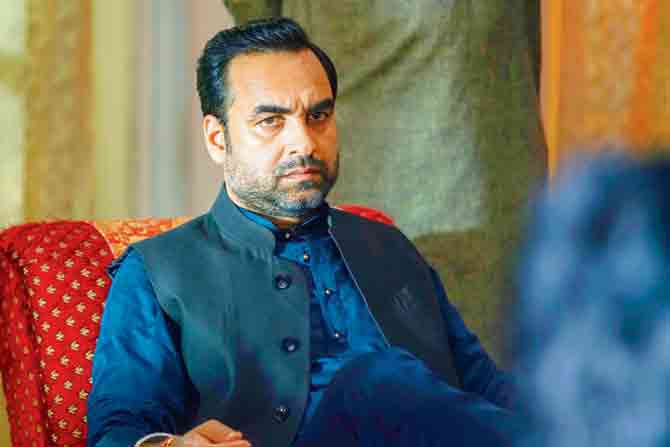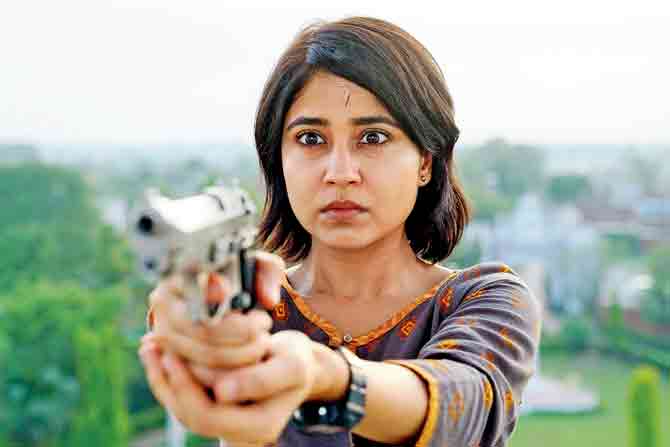With their characters walking the thin line of morality in Mirzapur 2, Pankaj Tripathi, Rasika Dugal and Shweta Tripathi, discuss the age-old struggle of good and bad. Perfect, we think, in the week when Durga is hailed as the slayer of evil

Actors Pankaj Tripathi and Divyenndu play father and son in Mirzapur 2
How does a college topper, interested in poetry and literature, winner of the year's student council elections, pick up a gun? Shweta Tripathi Sharma says playing Gajagamini 'Golu' Gupta in the Amazon Prime show, Mirzapur, has taught her that anything is possible. And to never be quick to judge. The second season, out this week, continues the story of three families in UP's infamous town of Mirzapur—Tripathis, Pandits and Guptas, whose lives are now inextricably intertwined. The blood, revenge, sex, love, and power mix makes for drama; drama of the heady kind that the actors hope stays restricted to their screen lives. Because "real life should be simple".
ADVERTISEMENT
Don Kaleen Bhaiya (Pankaj Tripathi), good-girl-gone-badass Golu Gupta, and second wife to the don, Bina Tripathi (Rasika Dugal) discuss the many interpretations of morality.
Edited excerpts from the interview.

Pankaj Tripathi
In season 2 of the series, are the characters grappling more deeply with the concept of morality?
Rasika Dugal: When I was offered the role of Bina Tripathi, I was excited to play a woman who is not morally upright. We are uncomfortable usually, with narratives where women explore their desires and sexuality. They are labelled immoral. But, Bina is not afraid. She is also a risk taker, who gets a thrill out of doing dangerous things. I didn't judge her. I have never judged people like her. I look at her with admiration, because her physicality is so different from mine. I may be awkward at times, and shy, too. But women like Bina are beautiful actually, open about their needs.
Of course, she faces the consequences. I was heartbroken at her plight at the end of season 1. She is humiliated. Now, her motivation is to regain her self-respect, and also revenge.
Shweta Tripathi Sharma: As an actor, I am blessed because I get to be and understand different personalities. What is right for me, may be wrong for my character, and vice versa. Playing Gajgamini 'Golu' Gupta, has strangely, made me a better person. We, humans, are very quick to judge—this is right, that is wrong. Pankajji's character, or his son, Munna's, also taught me a lot. I ask why is Munna the bad penny—why is he the way he is? We push people to a corner, and then we call them bad, if they react. We must take responsibility for what we do to others. The morality in this show is muted—real life is far more scary.
Pankaj Tripathi: As actors, when we explore other personalities outside our own selves, our morality gets stronger. In their crisis, their complexities, we find our moral compass. But the world of crime has no place for values. Perhaps by watching a show like this, the audience might understand what morality is really. When they see it go all over the place, they may understand what abandoning their morals can lead to.
Kaleen Bhaiya is a businessman, and also a don, but not publicly. At the end of season 1, he declares, however, that he is a Bahubali. He wants Munna to be like him. Although, his morals on the surface seem correct, deep down, there are problems [unlike the out and out grey Munna]. In real life, I think we find more people like Kaleen, less like Munna.

Shweta Tripathi
This season, several of you are also making the journey from good or semi-good to evil. How has life changed your beliefs?
STS: Golu is a headstrong girl, who has been challenged to face her own beliefs. The people she loved have been snatched away. To see something as brutal as your family being killed as you look on helplessly, changes you. Her priorities are now different, as is her environment. The show is about relationships actually—husband and wife, and two people who are now stuck together because of what happens to them [Golu and Guddu; Ali Fazal]. Her turning to revenge and violence makes my personal belief stronger—that if you pick up the gun, the end won't be nice. No one in Mirzapur is happy.
What causes more havoc—love or the thirst for power?
STS: Anything that leads to obsession can cause havoc. Even being addicted to a particular food or working out. Balance and respect are key. For example, I don't get obsessed by feedback. Which is why trolling doesn't bother me. I don't see too much into the comments, good or bad. If I let in the positivity and give it power, I will let in the negativity too. I want a lot of drama in my characters, but my life needs to be devoid of it.
PT: I agree. Characters should be complex, life should be simple. This is actually a story about three families—a policeman's, a don's and a lawyer's. They represent three sides of our society—the police, judiciary and crime. Everything is counted in terms of money, love and power. When crime mixes with judiciary and the sons of a lawyer join a don's gang—there is havoc.

Rasika Dugal
What about the ordinary man, and his angst? Where does he stand in all this chaos?
PT: The power games every one is playing is for the common man to watch. Shweta, does anyone in our show really reflect society?
STS: Not really!
PT: The ordinary man is enjoying our misery.
STS: But we are all sort of ordinary too. When Guddu first has a glimpse of Kaleen Bhaiya's life, he says, 'oh, life should be like this'.
PT: Yes, like the young students in Golu's class—they think of the criminal life as a good life. It's looking at that charm and glamour, that the two sons of the lawyer, get drawn into a life of crime.
What's the audience taking away from the story, you think?
RD: I don't think there is a message, but if viewers find a bit of themselves in the show, I think we have been successful.
PT: You may think it is only entertainment, but there is a subtext to every story. Crime ki duniya kisi ko kabhi bhi behtar jagah nahin le jaati hai. If villains are from Mirzapur, so are the heroes. So, everyone comes from the same place. We all live in a grey area—we move from black into white and vice versa as it suits us.
STS: There is a lot to learn—don't judge. If if you have a problem, talk about it. Conversation always leads to solutions. And, let the madness be on screen—make memes about the show and that's that. Don't get inspired by us.
Keep scrolling to read more news
Catch up on all the latest Mumbai news, crime news, current affairs, and a complete guide from food to things to do and events across Mumbai. Also download the new mid-day Android and iOS apps to get latest updates.
Mid-Day is now on Telegram. Click here to join our channel (@middayinfomedialtd) and stay updated with the latest news
 Subscribe today by clicking the link and stay updated with the latest news!" Click here!
Subscribe today by clicking the link and stay updated with the latest news!" Click here!







